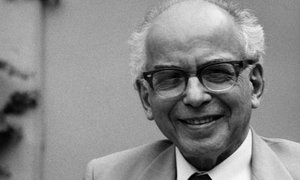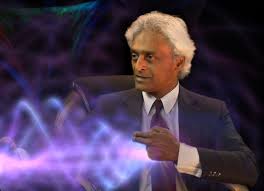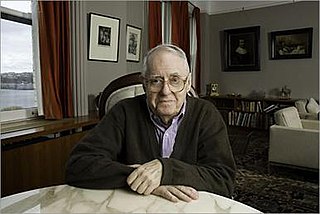Top 672 Integral Calculus Quotes & Sayings - Page 12
Explore popular Integral Calculus quotes.
Last updated on November 24, 2024.
If... [Alban] Berg departs so radically from tradition, through his substitution of a symmetrical partitioning of the octave for the asymmetrical partionings of the major/minor system, he departs just as radically from the twelve-tone tradition that is represented in the music of Schoenberg and Webern, for whom the twelve-tone series was always an integral structure that could be transposed only as a unit, and for whom twelve-tone music always implied a constant and equivalent circulation of the totality of pitch classes.
In reality, there is a single integral community of the Earth that includes all its component members whether human or other than human. In this community every being has its own role to fulfill, its own dignity, its own inner spontaneity. Every being has its own voice. Every being declares itself to the entire universe. Every being enters into communion with other beings.
In every phase of our imaginative, aesthetic, and emotional lives we are profoundly dependent on this larger context of the surrounding world.
My mother was a continual source of wisdom and great advice...she taught me that there is always a way around a problem-you've just got to find it. Keep trying doors; one will eventually open. She also taught me to accept failure as part and parcel of life. It's not the opposite of success; it's an integral part of success. I talk a lot about learning to become fearless in your approach to life. But fearlessness is not the absence of fear. It's the mastery of fear. It's all about getting up one more time than you fall down.
Am I more afraid Of taking a chance and learning I'm somebody I don't know, or of risking new territory, only to find I'm the same old me? There is comfort in the tried and true. Breaking ground might uncover a sinkhole, one impossible to climb out of. And setting sail in uncharted waters might mean capsizing into a sea monster's jaws. Easier to turn my back on these things than to try tjem and fail. And yet, a whisper insists I need to know if they are or aren't integral to me. Status quo is a swamp. And stagnation is slow death.
Casals says music fills him with the wonder of life and the 'incredible marvel' of being a human. Ives says it expands his mind and challenges him to be a true individual. Bernstein says it is enriching and ennobling. To me, that sounds like a good cause for making music and the arts an integral part of every child's education. Studying music and the arts elevates children's education, expands students' horizons, and teaches them to appreciate the wonder of life.
During my span of life science has become a matter of public concern and the l'art pour l'art standpoint of my youth is now obsolete. Science has become an integral and most important part of our civilization, and scientific work means contributing to its development. Science in our technical age has social, economic, and political functions, and however remote one's own work is from technical application it is a link in the chain of actions and decisions which determine the fate of the human race. I realized this aspect of science in its full impact only after Hiroshima.
Precocious and eccentric are okay. But I think that people in the arts represent something integral and kind of secretive in everybody else. So the reason people like some artists is because they're saying or doing something that they would like to do or say, but they don't have the balls or the means. People are really afraid to put their ass on the line. Just to put your face on a poster and put your name in big print and say "Come see me," that takes some cojones, you know? Ambition is nothing to be ashamed of.
Perhaps the single most powerful event facing humanity today is a great awakening on a planetary scale that has been millennia in the making. We humans are in the midst of a profound advance as a species to a higher form of global consciousness that has been emerging across cultures, religions and worldviews through the centuries. This awakening of global consciousness is nothing less than a shift, a maturation, from more egocentric patterns of life to a higher form of integral and dialogic patterns of life.
Our main source of psychic energy in the future will depend on our ability to understand this symbol of evolution in an acceptable context of interpretation. Only in the context of an emergent universe will the human project come to an integral understanding of itself. We must, however, come to experience the universe in its psychic as well as in its physical aspect. We need to experience the sequence of evolutionary transformations as moments of grace, and also as celebration moments in our new experience of the sacred.
Religion is not simply a theory, it is a higher life, of which morality is an integral part - a life devoted to the worship of the good and the true, for God, the absolute, is the supreme source of all perfection" ("La religion n'et pas une smple théorie, elle est une vie supérieure, dont la moralité fait partie intégrante - une vie vouée au culte du bien et du vrai, car Dieu, l'absolu est la source de toute perfection", Fr.)
We need to realize that these industrial methods of farming have gotten us used to cheap food. The corollary of cheap food is low wages. What we need to do in an era when the price of food is going up is pay better wages. A living wage is an absolutely integral part of a modern food system, because you can't expect people to eat properly and eat in a sustainable way if you pay them nothing. In fact, it's cheap food that subsidized the exploitation of American workers for a very long time, and that's always been an aim of cheap food.
Freud, Jung thought, had been a great discoverer of facts about the mind, but far too inclined to leave the solid ground of "critical reason and common sense." Freud for his part criticized Jung for being gullible about occult phenomena and infatuated with Oriental religions; he viewed with sardonic and unmitigated skepticism Jung's defense of religious feelings as an integral element in mental health. For Freud, religion was a psychological need projected onto culture, the child's feeling of helplessness surviving in adults, to be analyzed rather than admired.










